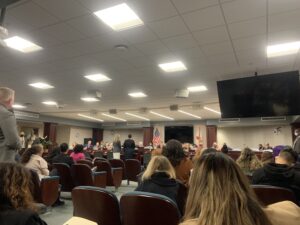
During Thursday’s meeting of the Florida House Health and Human Services Committee, pro-life protesters and advocates for reproductive freedom gathered at the Florida Capitol for the bill’s final hearing before it goes to the full chamber.
Regardless of the pushback of HB 5, the 15-week abortion ban that has gained considerable controversy in the state, the bill moved forward by a vote of 14 to 7 along party lines. If this proposal passes, the current abortion ban — which is set in the third trimester at 24 weeks — will be shortened to 15 weeks. There is no exception for victims of rape or incest, and the only legal procedures of abortion is if the mother is in danger or the fetus has a “fatal fetal abnormality.” Prior to the vote, Rep. Michele Rayner attempted to file an amendment that removed all abortion-related language in the bill. But after urging her Republican colleagues to accept the amendment, it failed with a vote of 14 to 7.
In response to the amendment, Rep. Tyler Sirois, who believes 15 weeks is a reasonable bill in comparison to the Texas abortion ban that reduced the time to six weeks, said that Rayner’s amendment “undermines the intention of this legislation.”
“This bill is unconstitutional,” Rayner said in response to Sirois’ comments. “We will be passing unconstitutional legislation that will cost Floridians more money and more time.”
Following the vote on the amendment, the crowd was unsettled in preparation for the public testimonies for HB 5, only for committee chair Colleen Burton to announce that the public would be allotted 30 seconds to speak. This led to Rep. Tracie Davis pleading to allow one-minute testimonies, which led to the decision to extend the time to 45 seconds.
Aurelie Colon, a representative of the Latina Institute for Reproductive Justice Florida, was one of the many attendees who gave a speech on Thursday morning.
“Reproductive justice was birthed in the ’90s by Black women to center those who are most impacted by social and reproductive injustices we see in this country,” she said. “Sister Song defines reproductive justice to maintain personal bodily autonomy, have children, not have children, and parent the children we have in safe and sustainable communities. Co-opting language from the birth of the reproductive justice framework to advance a political agenda while there is a maternal mortality crisis in the state of Florida is disgraceful.”
Following the vote to move the bill forward in the House, the bill’s next stop is the floor of the House of Representatives on Wednesday, Feb. 16, 2022.